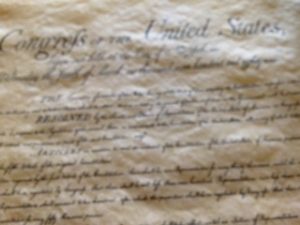 On September 17,1787, the delegates to the Constitutional Convention finally signed the Constitution after months of deliberation. Two years later, on September 25, Congress approved the first twelve amendments to the document. The first ten became the Bill of Rights, with #1 often bandied about in the news and everyday conversation, too.
On September 17,1787, the delegates to the Constitutional Convention finally signed the Constitution after months of deliberation. Two years later, on September 25, Congress approved the first twelve amendments to the document. The first ten became the Bill of Rights, with #1 often bandied about in the news and everyday conversation, too.
So, what are our First Amendment rights?
Most frequent answer: “Freedom of Speech.” But what else?
Writes the Freedom Forum’s Karen Hansen: “The five freedoms we celebrate on First Amendment Day protect the fundamental ways we participate in society and in democracy. They are:
- Praying and worship—or not—in accordance with our own beliefs.
- Speaking our minds, even and especially, when we disagree.
- Publishing news, opinions, ideas and information, including to hold those in power accountable.
- Gathering peacefully together to amplify our voices.
- Bringing problems to government representatives and suggesting solutions.”
And it has stood the test of time, even as the times keep changing.
Jan Neuharth, chair and chief executive office of the Freedom Forum, recently reported on a survey the organization conducted that asked 3,000 Americans how they feel about the First Amendment today. 94% of respondents across generations and the political spectrum said the First Amendment is “vital,” but also…
** More than 33% would give up free speech to get rid of hate speech. About 33% support unrestricted
free speech.
** 69% say social media should be held responsible for allowing false/misleading information postings.
** 37% say business owners must fulfill customer requests that violate their religious beliefs.
** 60% say the news media should act as watchdogs on the powerful but just 14% trust journalists.
** 75% think government COVID mandates don’t violate the First Amendment, but 25% say they do.
** Despite countless protests, 69% have never participated in a protest, rally, or march.
** 73% have signed a petition but just 14% know it is one of our First Amendment freedoms.
And now comes this: The National Archives Records Administration has placed a “harmful content” on the Constitution, labeling it as “harmful or difficult to view,” and that includes both the Bill of Rights and the Declaration of Independence.
Layer that tidbit with the fact that, on the State of State Standards for Civics and U.S. History in 2021, Massachusetts came out with the only A, and it came with a minus sign.
Any surprise, then, that just 48% of recently surveyed college freshman say they’re optimistic about the United States…?
~ Carol